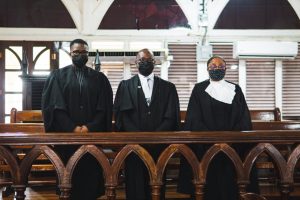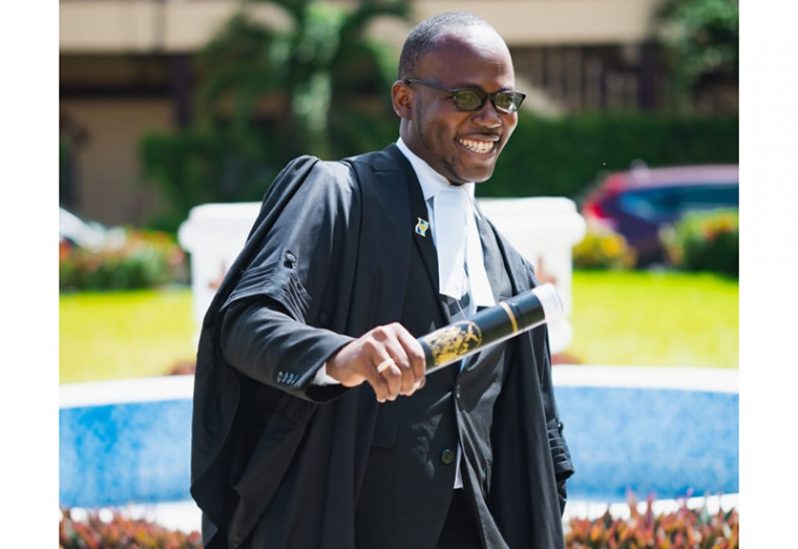– intensifies efforts to better represent indigenous people
By Vishani Ragobeer
DEXTER SMARTT, who hails from Mahaica on the East Coast of Demerara (ECD), was, on Thursday last, admitted to the local bar to practise law by Chief Justice (ag.), Roxane George. after his petition was presented by attorneys-at-law Faye-Ann Barker and Dexter Todd.
The young man completed his Legal Education Certificate (LEC) at the Hugh Wooding Law School (HWLS) in Trinidad and Tobago a few months ago, in 2020. Before that, he was able to complete his Bachelor degrees in International Relations (IR) and Law at the University of Guyana (UG).
During an interview with the Sunday Chronicle, Smartt related that he was encouraged to pursue a career in the legal profession while engaging in a third year IR course called International Law. Then, Sheldon McDonald who was the Head of Department of Law at UG at the time, encouraged him to pursue this field, affirming that the young Smartt would be able to serve more persons this way.
McDonald knew that the young man was an avid volunteer, dedicating his time to serving others. And so, Smartt eventually applied and was accepted into UG’s law programme. Though McDonald passed away soon after, Smartt continued to pursue studies in this field- encouraged by his grandparents- as a way of honouring the HoD, and in addition to his own desire to become qualified.
Reflecting on the years of study, Smartt gave a heavy sigh and then said, “It was tiring…but fun. It was very edifying, because every day you learnt something, which was great.”
He spent three years pursuing law at UG and then an additional two at the HWLS for his LEC. During this time, Smartt was juggling multiple jobs and a myriad of health issues. Yes, it was a challenge but he pushed through and was able to learn better time management. Additionally, he was supported by his family and friends, who were a strong support system for him.

Currently, Smartt is working with Dexter Todd and Associates, dealing with Company, Civil and Criminal matters. But, that’s not all he spends his time doing.
He recently started his own organisation called “Ubuntu” through which he aims to provide better representation to Guyana’s indigenous people. The impetus for this has its genesis years ago, when he was engaged in a project that allowed him to visit prisons and interview prisoners.
“In doing so, I realised that eight out of 10 Amerindian prisoners didn’t understand English properly and I was wondering how were they able to represent themselves properly or explain to the court what their problem was if they really don’t understand English,” he said, adding, “Most of them were even unrepresented when they went to court.”
Another issue he discovered was that when these individuals had served their time in prison, it was difficult for them to return to their home communities because they were unable to identify the region or village they hailed from.
“Many of them just know the call name of the area (and) I saw that as being a very very big issue because we can’t claim to reform somebody if that’s the way we treat them when they go back on the streets,” Smartt lamented.
Through this organisation, in the months since he has returned to Guyana from Trinidad, he has engaged in consultations and research. He has given himself up to January next year to engage with toshaos and other indigenous peoples’ representatives, including the Ministry of Amerindian Affairs, to see how he would be able to assist. A crucial component of this engagement would include collaborating with them for language translation services.
He also indicated that he will be directing some of his efforts towards fostering youth empowerment and education.
“Service is very important to me. Most of my life has been about service and I’ve been volunteering for about 14 years,” Smartt emphasised.
In his professional life, he intends to qualify himself further. He is currently pursuing a Diploma in Global Leadership and he will be starting a Masters in Energy and Environmental Law in March; he is already thinking about pursuing a Doctor of Philosophy (PhD), possibly in International Law.
“I do not intend on stopping,” he half-joked, “I like learning, because the more I know, I can better service people but at some point I’m going to pause, because I can’t serve people if I don’t have enough time.”
Aside from his unfolding academic and professional journey, Smartt said, “I dedicate my entire LEC journey and admission to the bar to medical professionals because of how much my doctors did to keep me alive over the years.”



.jpg)











